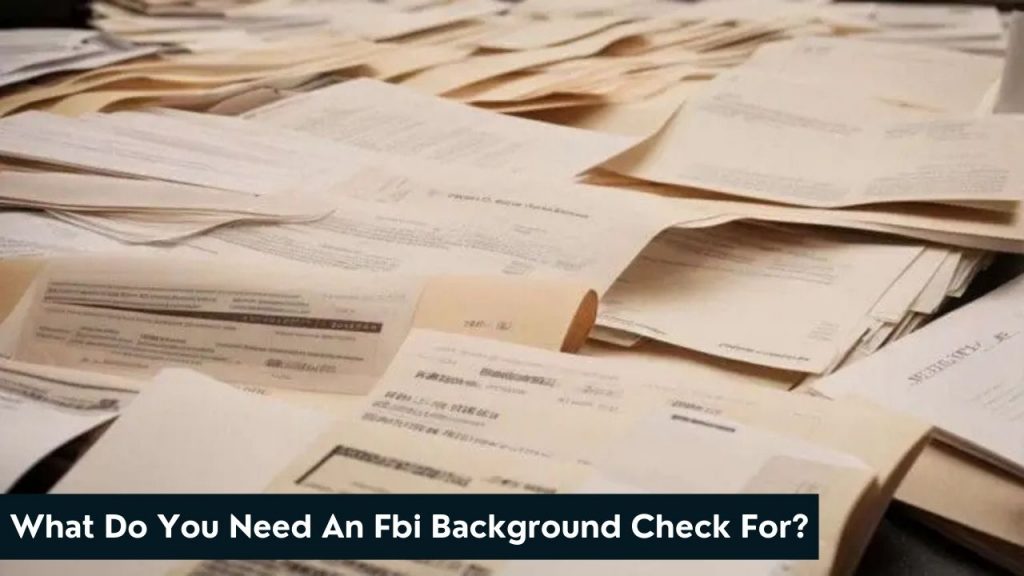The Federal Bureau of Investigation (FBI) background check is an essential part of various legal, employment, and immigration processes. Whether you’re applying for a job, seeking a visa, or adopting a child internationally, an FBI background check may be required. This comprehensive report provides insight into an individual’s criminal history by analyzing their fingerprints and other identifying data.
The purpose of this article is to answer all your questions about FBI background checks, explain why they’re needed, and guide you through the process of requesting one. Additionally, we’ll cover how to interpret the results and what steps to take if you find errors in your report. By the end, you’ll have a clear understanding of when and why you might need an FBI background check.
What Is an FBI Background Check?
An FBI background check is a summary of an individual’s criminal history. It’s compiled by the FBI’s Criminal Justice Information Services (CJIS) Division, which gathers and maintains records on arrests, charges, convictions, and other law enforcement interactions. These reports are primarily used for law enforcement purposes but are also requested by employers, foreign governments, and other entities.
The report includes personal data, such as your name and birth date, along with information collected through fingerprints. Fingerprints are a reliable means of identification because they are unique to each individual. The background check covers nationwide records, making it one of the most comprehensive criminal history reports available.
How FBI Background Checks Work
FBI background checks rely on biometric data, primarily fingerprints, to ensure accurate identification. This data is cross-referenced with a vast national database of criminal records. When you request an FBI background check, you’ll be asked to submit your fingerprints through an authorized service, either electronically or on a fingerprint card.
Once the fingerprints are submitted, the FBI compares them to its Integrated Automated Fingerprint Identification System (IAFIS). The IAFIS contains millions of records from across the U.S., including criminal records, arrest information, and other law enforcement data. If a match is found, the relevant information is included in the report.
Why Are FBI Background Checks Required?
FBI background checks serve multiple purposes and are used in various contexts to ensure public safety, verify identity, and assess an individual’s suitability for sensitive roles. Here are some common reasons why an FBI background check may be required:
- Employment: Jobs that involve handling sensitive information, working with vulnerable populations, or having access to secure locations often require an FBI background check. This includes positions in law enforcement, government agencies, and educational institutions.
- Immigration: Foreign governments often request FBI background checks as part of visa applications, green card processes, or naturalization.
- International Adoption: When adopting a child from another country, prospective parents may be asked to submit an FBI background check to ensure they meet the legal and ethical requirements.
- Personal Record Review: Individuals can request an FBI background check to review their own criminal history, often to dispute inaccuracies or ensure their record is clear before a job application or legal process.
Expanding the Scope: Associated Services and Necessities
In conjunction with the necessity for an FBI background check, there are several related services that play critical roles in specific circumstances. These include FBI apostille services, FBI background check apostille, FBI apostille translation, and ink fingerprinting. These services are essential for individuals who need to validate the legality of their background check internationally, particularly for countries that are members of the Hague Apostille Convention.
Types of FBI Background Checks
There are several different contexts in which FBI background checks are used, each serving a unique purpose. Understanding the types of background checks will help clarify when and why they are necessary.
Employment-related FBI Background Checks
Certain employers, especially those in government, healthcare, education, and finance, require FBI background checks to ensure that their employees or contractors do not have a disqualifying criminal history. This is particularly important for roles that involve national security, access to sensitive information, or positions of trust with vulnerable populations (e.g., children or the elderly).
Immigration and Visa Processes
FBI background checks are often part of the immigration process, especially for those seeking permanent residency (green cards), citizenship, or visas. U.S. Citizenship and Immigration Services (USCIS) and other agencies rely on FBI background checks to determine if applicants have any criminal records that could make them inadmissible.
Personal Record Requests
Individuals can request their own FBI background check to review their criminal history. This is useful if you want to see what potential employers, landlords, or other entities might find when they run a check. It’s also helpful for verifying the accuracy of your records or addressing any issues before they impact your applications.
International Adoption
Adopting a child from another country typically requires an extensive background check. Prospective adoptive parents need to demonstrate that they have no criminal history that would prevent them from providing a safe and nurturing home. An FBI background check is a crucial component of this vetting process.
What Information Does an FBI Background Check Include?
FBI background checks include a range of information that helps employers, immigration officials, and others assess an individual’s legal history. The key components of the report are:
Criminal History Records
An FBI background check contains detailed criminal records, including:
- Arrest records: Information on past arrests, regardless of whether the individual was convicted.
- Charges: Details of the criminal charges filed, whether they resulted in a conviction or were dismissed.
- Convictions: Information on convictions, including the nature of the offense and sentencing details.
Arrest Records
An arrest record will include the date of the arrest, the arresting agency, and the nature of the charges. Even if the charges were later dropped or the individual was acquitted, the arrest itself can still appear on the FBI background check.
Fingerprint Data
The FBI background check process relies on fingerprints to match individuals with their criminal history. This data is crucial because it ensures the accuracy of the information, reducing the chance of mistakes caused by name similarities or clerical errors.
How to Request an FBI Background Check
Requesting an FBI background check can be done in a few different ways, depending on your needs and location. Below are the main methods:
Online Application Process
The FBI has streamlined the process for requesting a background check through its electronic portal. This is the fastest and most convenient way to submit your request, as you can complete the application online and upload your fingerprints electronically.
Mail-in Process
For those who prefer traditional methods, you can request a background check by mailing your completed application form, fingerprint card, and payment to the FBI. It may take longer to receive your results, but this option is widely available.
Request Through Channelers
FBI-approved channelers are private companies authorized to collect and submit fingerprints to the FBI. Using a channeler can expedite the process, especially if you need your results quickly.
How Long Does It Take to Get an FBI Background Check?
The time it takes to receive an FBI background check varies depending on the method of submission and the current demand.
Standard Processing Time
Typically, the FBI takes 3 to 5 business days to process electronic requests. For mail-in requests, it can take up to 3 weeks to receive the results, depending on factors such as mailing times and processing queues.
Expedited Services
Using a channeler or opting for an electronic request may reduce the processing time. Some services offer expedited background checks for individuals who need their results urgently, such as for a time-sensitive job application or immigration deadline.
How FBI Background Checks Impact Your Employment
Employers typically use FBI background checks to assess whether a candidate is suitable for a particular job. The impact of the background check depends on the type of role and the severity of any criminal record.
Passing the Background Check
For many positions, simply passing an FBI background check is a standard requirement. Employers may look for specific types of offenses, such as felonies or violent crimes, that would disqualify a candidate.
What If You Have a Criminal Record?
If you have a criminal record, it’s important to be honest with potential employers. Some offenses may not automatically disqualify you from a job, especially if they occurred many years ago or are unrelated to the position.
Frequently Asked Questions (FAQs)
1. What’s the difference between an FBI background check and a state background check?
An FBI background check covers national criminal records from all U.S. states, territories, and federal law enforcement agencies, using fingerprint data. A state background check only covers crimes committed within that specific state and might not be as comprehensive. FBI checks are more suitable for jobs that require a broader criminal history review, such as federal jobs, immigration, or international purposes.
2. How do I know if I need an FBI background check?
You may need an FBI background check for several reasons, including:
- Employment in government or sensitive sectors like law enforcement or healthcare.
- Immigration purposes, such as applying for a visa, green card, or citizenship.
- International adoption procedures.
- Personal reasons, like reviewing your criminal record or correcting inaccuracies. Check with the organization requesting the background check to determine if an FBI report is necessary.
3. Can employers request an FBI background check directly?
Employers cannot directly request an FBI background check unless they are part of a government agency or authorized institution. However, they can request your consent to perform a background check, and third-party services may process the FBI report on behalf of employers, especially for jobs requiring security clearance or positions of trust.
4. What happens if I fail an FBI background check?
Failing an FBI background check typically means that your criminal history contains disqualifying information, such as felony convictions or violent crimes. However, the consequences depend on the purpose of the check. For jobs, some employers may have flexibility depending on the nature of the offense. For immigration or adoption purposes, failing a background check could result in denial of your application.
5. How long is an FBI background check valid?
There is no official expiration date for an FBI background check. However, most organizations request a new check if the report is older than six months to a year, especially for employment, visa applications, or immigration purposes. It’s important to check with the requesting organization to ensure your report is still valid.
Conclusion
FBI background checks play a crucial role in safeguarding public trust and ensuring legal compliance. Whether for employment, immigration, or adoption, understanding the process and maintaining accurate records is essential for success.


